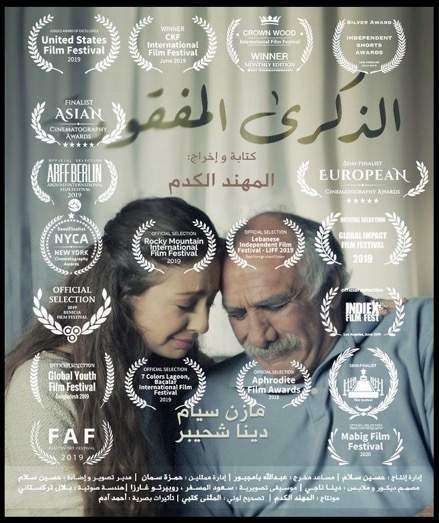
Some films speak to a specific audience and some films are universal in their ability to connect emotionally regardless of language or culture. Films like this are the epitome of what all filmmakers try to achieve. Lost Thekra is such a film. Director Almahannad Alkadam and producer Hussain Alsadeq were adamant that the musical personality of this film needed to provide an emotional impact equal to that of the story and recruited composer Roberto Garza Gamez in hopes of achieving this. Ten awards and twenty-three nominations later, Alkadam and Alsadeq feel vindicated that their choice was well made. Roberto’s melodies and percussive style is a chrysalis which magnifies and propels the evolution of this story.
To allow the viewer to inhabit the main character’s mind, Roberto created music that was steeped in a dreamlike state with an aura of dark undertones. Vacillating between sadness and a sense of being distraught to happiness and nostalgia, the musical bed supports these scenes shrewdly and subtly navigates breakneck emotional turns with a prescient benevolence. Describing his intent to bring emotion though the score, Roberto remarks, “Big moments of emotions being displayed like father and daughter interactions were highlighted clearly with music. Sadness, love, nostalgia and pride were emotions that had to be portrayed clearly through music to highlight scenes that were important to the plot. The music helped the audience feel what the characters were feeling in the film. It gave an environment to the places they were in and it helped the plot to move forward in a clear manner.”
The journey of Lost Thekra is relatable to anyone who has a connection with the devastating impact of Alzheimer’s. Through the experiences of a sixty-year-old man named Khalid, the audience has a direct perspective regarding the loss of memory and its destruction. As the film cuts between past and present day, we are dragged into the wake of disorientation and moments of lucidity. Khalid’s daughter [Raghed] is his companion throughout most of the story and their connection is the true core of this film. The surprising turn of events in the third act of the story is a sucker punch that exhibits the exceptional writing of this production. Connecting the dots between dementia and space travel is just one of the many surprises that this film has to offer.
Quick to admit that he’s more comfortable speaking with his music rather than with actual words, Roberto points out that he’s very satisfied with how his compositions allowed Almahannad Alkadam and Hussain Alsadeq’s film to resonate with a wider global audience. Wins at the USA Film Festival, Festigious International Film Festival, Los Angeles Film Festival, and others, in addition to numerous nominations across the globe (New Delhi Film Festival, New York Film Awards, Global Impact Festival, etc.) have raised the visibility of all involved in creating Lost Thekra to a vast international audience. He communicates, “I feel that my music brought depth and weight into the film. The film focused on a serious topic of memory loss. I felt the music had to convey seriousness and darkness. While not being overly dark or suspenseful, it had to create confusion and to feel almost dream-like, as if you were trapped in some sort of limbo. I used it to connect all the scenes in a smooth way. The film goes from past to present continuously, so the music underscores all of the memories and presents into a smooth connected timeline. This is a contrast to the time jumps the film has but the music solidifies a straight line into these jumps, creating some kind of glue in the film to connect each transition without feeling too jarring.” He continues, “Another aspect that I wanted the music to bring to the film was a sense of space. While not being intrusive to the dialogue, the music had to set the tone and mood and let the audience know from the very beginning what kind of film this was going to be. While not giving much detail of the plot, the music foreshadows its mystery. At times, the score had to be ambient in many ways as background and at other moments be far more present. So it was a shift of background and foreground. It gave space to the dialogue and in other instances it took over and highlighted the important moments.” With this shifting approach, the score of Lost Thekra allows us to more deeply feel the turbulent sense of reality that Khalid experiences and deeply connect with the intent of the film’s creator.
Writer: Basil Thomson